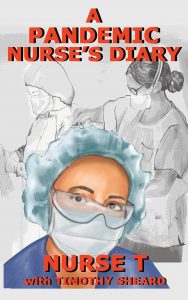BOOK REVIEW
Nurse T. with Timothy Sheard
Hardball Press, Sept. 2020
In her diary, Nurse T. offers a first person account of working in a public hospital as the initial wave of coronavirus swept through NYC. The diary describes the personal, physical and emotional toll on the staff as they face overwhelming conditions each day. It also tells the stories of individual patients, illustrating the deep commitment to care demonstrated by the nurses, doctors and ancillary staff. More broadly, it shines a light on the broken healthcare system in the US.
In an ICU, “now twice as busy as usual,” Nurse T describes working with a lack of PPE, with shortages of common medications, with four or more “code blues” a day, and with no room in the morgue to store the dead. Adding to that stress is the frustration of working without a clear picture of the complex of symptoms caused by the virus. The public hospital where Nurse T. works, like many across the country, serves people primarily of color and the poor; often immigrants.
The majority of clients lack access to primary care. As a result, patients present to the emergency room seriously ill, their symptoms often compounded by untreated chronic health problems. Care is provided with no questions asked to all uninsured or under-insured patients. This costly approach to health care—in terms not only of cash but also people’s wellbeing–is the norm across the country. The arrival of the pandemic has only exacerbated the problem.
The infrastructure in many public hospitals has crumbled over the years due to lack of financial support from city, state and federal governments. Medicare and Medicaid do not reimburse hospitals at a reasonable rate, leaving poorer hospitals unable to pay for improvements, or in some cases even to remain open. The poorer clients and communities they serve suffer the consequences. Nurse T. explains, “My hospital can barely pay wages and expenses under normal times. In a crisis we are stripped bare.” Unable to update equipment, to replace oxygen delivery systems or to provide more staff, these hospitals, already financially strapped, are ill prepared for the increasing numbers of patients being admitted with the virus.
Patients with Covid need much more staff attention and often remain hospitalized three times longer than a typical critical patient. Patients with Covid also require negative-pressure isolation rooms to keep infected air from escaping into the halls and other rooms.
Each time a person enters an isolation room, they must wear PPE: gloves, gowns, masks, goggles or face shields, shoe covers, and in some cases a full hazmat suit equipped with a respirator. During the first weeks of the pandemic, Nurse T.’s staff was warned by administration that they were using “too much” PPE because there were “not enough masks in stock” to supply the whole staff.
By April, the critical care department spent money from their own budget to purchase the specialized masks needed. Asking when fans might be installed to create more negative pressure rooms in the ICU, Nurse T. was told a plan for upgrades was coming but would ‘have to wait until after the pandemic’.
Over the following months, the nurses worked mandatory overtime, four 12-hour shifts in a row, while the codes and the deaths continued. Nurse T writes that ICU nurses are “used to encountering death, but not so many dying in a day.” When one patient dies it frees a bed for the next patient…
Repeated requests to a pharmaceutical company to be included in clinical trials of a promising treatment were denied without explanation. The hospitals enrolled in the trial were already using the drug, leaving the people working with Nurse T. to wonder if denial was based on the financial state of the hospital or the color of the people they served. Nurse T. gives voice to the inequality, saying the cause of death listed on death certificates should read “hospital poverty due to refusal of the government to provide adequate resources and staff for impoverished people of color.”
By August the surge of Covid patients had lessened, staffing had improved and more treatment protocols were in place. With better knowledge of the complexities of the virus, the death rate was lower than it might have been.
Anticipating another surge of the virus in the fall however, Nurse T. fears by then the staff will be “hollowed out by illness, fatigue, despair and death”.
Outside the hospital, not only is the virus itself invisible but most Americans can’t see what it does to severely ill people unless that person is someone they know. Instead they see people, even themselves, recover from mild cases of Covid, or the privileged few who receive the most advanced and expensive treatments leave the hospital declaring they “beat” the virus.
Those who actually see the full effect of Covid are exhausted by the volume of patients, shortages and outdated equipment; weary of hearing “the virus will just disappear”—“it’s just a flu;” and distressed by people refusing to wear masks. They are tired of politicians playing down the danger of Covid and fighting reasonable efforts to contain it. As Nurse T. reminds us, “the resource of the healthcare system isn’t a miracle drug or a vaccine, it’s the expertise of the healthcare workers.” Nurse T. warns, “hospitals will have nowhere to treat and no one to help treat” as admissions reach capacity and nurses continue to burnout.
An addendum to the book, Healing Meditations for Caregivers, offers tips and exercises for self-care, as well as encouragement to channel anger by “using the energy to make a difference in your community. Individuals can begin by replacing failed leaders; working to implement public health and taking part in political associations to promote social justice, public health and equality for all.”
Veronica Atkinson, is a retired RN who lives in Grays Harbor County
Hard Ball Press
After writing six crime novels featuring Lenny Moss, hospital custodian, union steward and amateur detective, Timothy Sheard launched an independent publishing company, Hard Ball Press, in order to mentor and publish working class writers. You’ll find books ranging from history, memoir, YA, detective stories and more—often featuring union characters and insiders’ stories of union fights. Hard Ball is the publisher of the popular series featuring shop steward turned detective Lenny Moss. For a peek at hard-to-find titles go to
Hard Ball Press.

Thank you Veronica Atkinson and Works in Progress for your thoughtful review of Nuree T’s Diary and for supporting social justice in the US and the world. Much, much appreciated. Timothy Sheard, editor Hard Ball Press